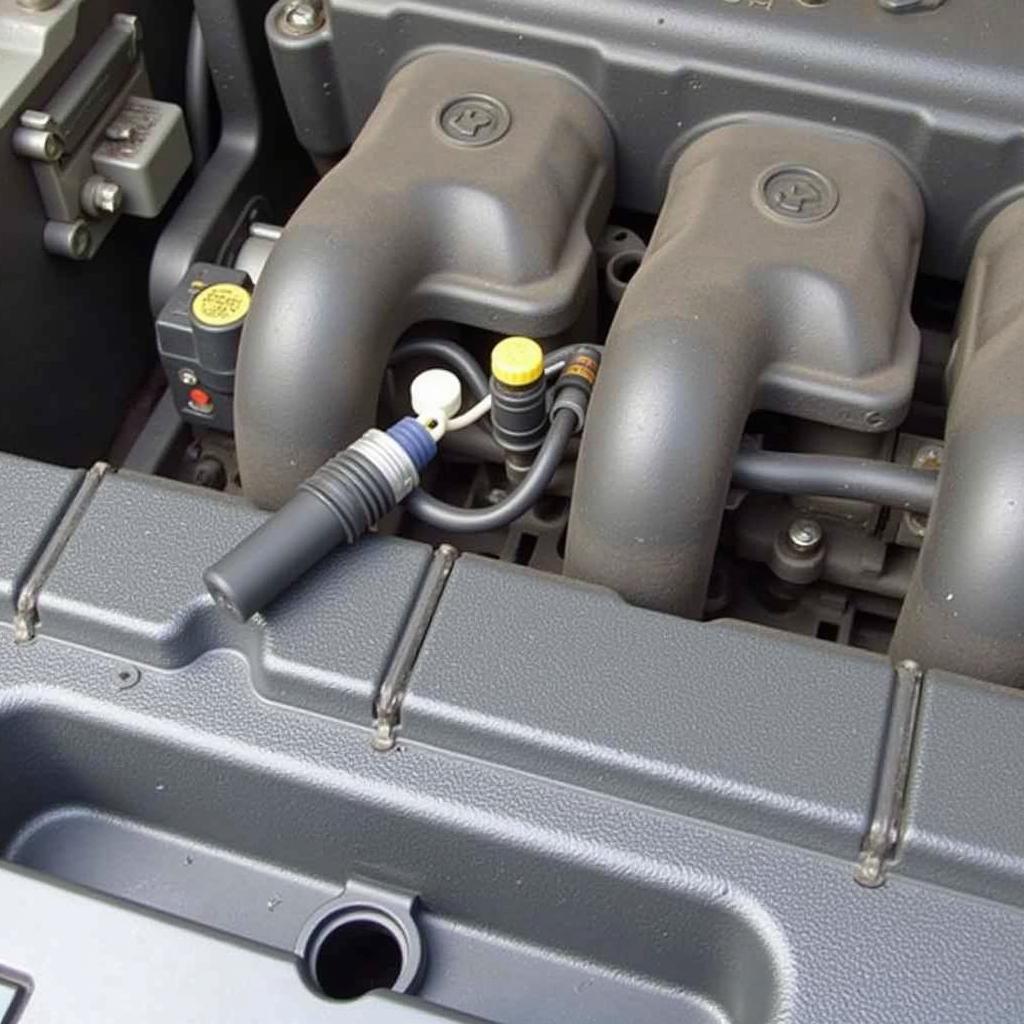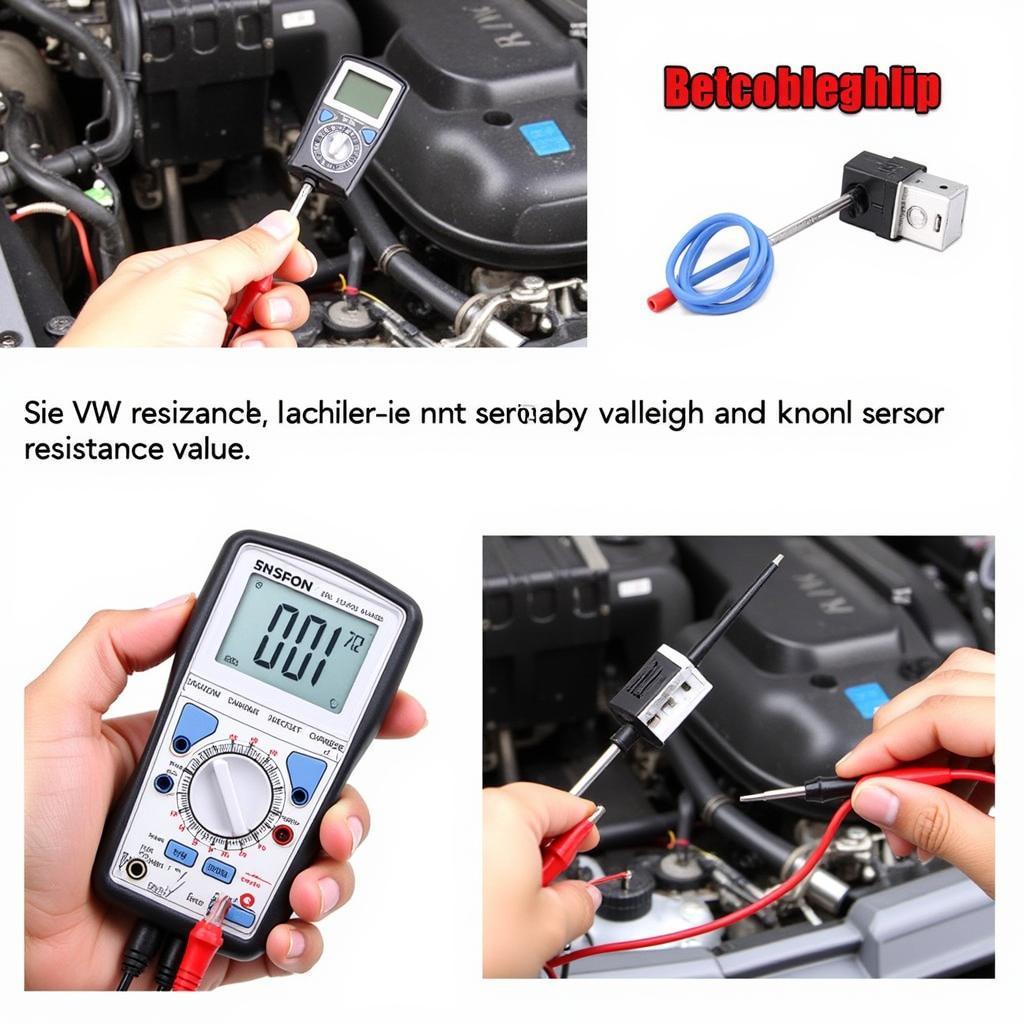Your cart is currently empty!

VW Knock Sensor Code: Troubleshooting and Solutions
The dreaded “vw knock sensor code” can be a real headache for Volkswagen owners. Whether you’re a seasoned mechanic or a DIY enthusiast, understanding this code and its implications is crucial for keeping your VW running smoothly. This article will dive deep into the causes, symptoms, diagnostic procedures, and solutions related to the knock sensor code in Volkswagen vehicles.
If you’re experiencing issues with a specific code, such as the P0327, you can find more information at vw jetta code p0327.
What is a Knock Sensor and Why is it Important?
The knock sensor is a small but vital component of your VW’s engine management system. It listens for abnormal engine vibrations, specifically the “knocking” or “pinging” sound that occurs when the air-fuel mixture detonates prematurely. This premature detonation can cause significant engine damage if left unchecked. The knock sensor alerts the engine control unit (ECU), which adjusts the ignition timing to prevent further knocking. A malfunctioning knock sensor or related wiring can trigger a check engine light and store a knock sensor code.
Common Causes of a VW Knock Sensor Code
Several factors can trigger a knock sensor code in your Volkswagen. These include:
- Faulty Knock Sensor: The sensor itself can fail due to age, wear, or exposure to extreme temperatures.
- Wiring Problems: Damaged or corroded wiring connecting the knock sensor to the ECU can disrupt the signal and cause a code.
- Loose Connections: A loose connection at the sensor or the ECU can also lead to a knock sensor code.
- Low Quality Fuel: Using low-octane fuel can cause engine knocking, which may trigger a code even if the sensor is functioning correctly.
- Mechanical Engine Problems: Serious issues like worn connecting rod bearings or a damaged piston can also cause knocking and trigger the code.
 VW Knock Sensor Location
VW Knock Sensor Location
Symptoms of a VW Knock Sensor Code
Besides the illuminated check engine light, you might notice other symptoms like:
- Reduced Engine Performance: The ECU might retard the ignition timing to prevent knocking, leading to decreased power and fuel efficiency.
- Rough Idle: The engine might idle unevenly or vibrate excessively.
- Hesitation or Stuttering: The car might hesitate or stutter during acceleration.
- Engine Knocking or Pinging: You might hear audible knocking or pinging sounds coming from the engine, especially under load.
Sometimes, specific codes can indicate more complex problems, such as those related to fuel mixture, as seen with the 2008 vw passat 2.0 t code p0171.
Diagnosing a VW Knock Sensor Code
Diagnosing a vw knock sensor code requires a systematic approach. You will likely need an OBD-II scanner to read the specific code stored in the ECU.
- Retrieve the Code: Connect the OBD-II scanner and retrieve the specific knock sensor code.
- Inspect the Wiring: Visually inspect the wiring harness connected to the knock sensor for any signs of damage, corrosion, or loose connections.
- Test the Sensor: Use a multimeter to test the knock sensor’s resistance. Refer to your VW’s service manual for the correct resistance specifications.
- Check for Mechanical Issues: If the sensor and wiring are okay, consider inspecting the engine for potential mechanical problems like worn bearings or damaged pistons.
 VW Knock Sensor Testing with Multimeter
VW Knock Sensor Testing with Multimeter
“A thorough diagnostic approach is crucial,” says renowned automotive engineer, Dr. Hans Mueller, “Don’t just replace parts without proper testing. You might be wasting time and money.”
Fixing a VW Knock Sensor Code
Once you’ve identified the cause of the knock sensor code, you can take appropriate action. This might involve:
- Replacing the Knock Sensor: If the sensor is faulty, replace it with a new, OEM-quality part.
- Repairing the Wiring: Repair or replace any damaged or corroded wiring.
- Tightening Connections: Ensure all connections are secure.
- Using High-Quality Fuel: Switch to the recommended octane fuel for your VW.
- Addressing Mechanical Issues: If mechanical problems are identified, address them promptly by a qualified mechanic.
How Much Does it Cost to Fix a VW Knock Sensor Code?
The cost of fixing a vw knock sensor code can vary widely depending on the underlying cause and whether you do the repair yourself or hire a mechanic. Replacing the knock sensor itself is relatively inexpensive, but addressing mechanical engine problems can be significantly more costly.
Another common code in VW vehicles is the 2181, and you can find more resources about it on vw code 2181.
Preventing Future VW Knock Sensor Codes
Regular maintenance can help prevent future knock sensor issues. This includes:
- Using Quality Fuel: Stick to the recommended octane fuel.
- Regular Tune-Ups: Ensure your engine is running smoothly.
- Addressing Engine Issues Promptly: Don’t ignore any unusual engine noises or performance issues.
“Preventive maintenance is key to avoiding costly repairs down the road,” advises master technician, Franz Wagner, “Regular checks can save you a lot of trouble in the long run.”
Conclusion
Addressing a vw knock sensor code is crucial for maintaining your vehicle’s performance and preventing costly engine damage. By understanding the causes, symptoms, and diagnostic procedures, you can effectively troubleshoot and fix the issue. For further assistance with VW trouble codes like the 03216 or 17324, check out the resources on 03216 vw code and 17324 vw code. If you need expert help, don’t hesitate to contact us at VCDSTool at +1 (641) 206-8880 and our email address: vcdstool@gmail.com or visit our office at 6719 W 70th Ave, Arvada, CO 80003, USA.
by
Tags:
Leave a Reply